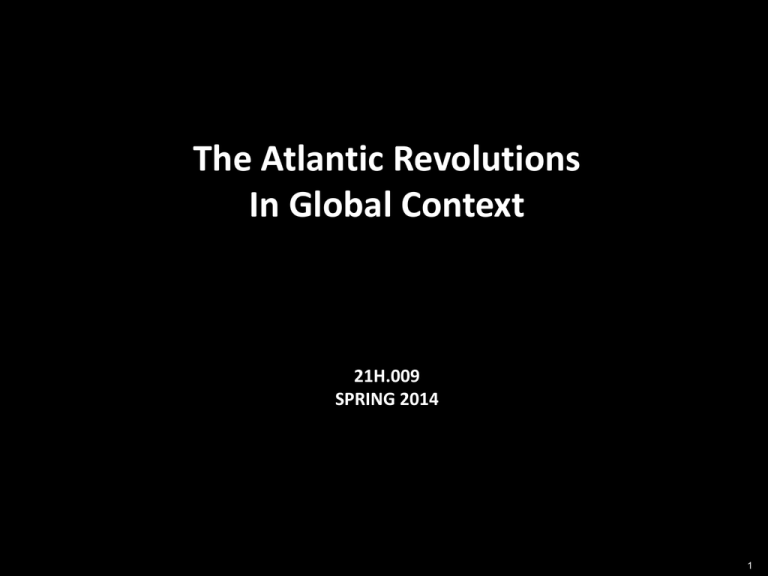
The Atlantic Revolutions
In Global Context
21H.009
SPRING 2014
1
Atlantic Revolutions Chronology, 1756-1831
1756-1763: Seven Years War
1776-1783: American War of Independence
1789-1799: French Revolution
1791-1804: Haitian Revolution
1808-1831: Latin American Wars of Independence
2
All European Empires ca. 1754
This image is in public domain.
3
© The Thomason Corporation. All rights reserved. This content is excluded from our Creative
Commons license. For more information, see http://ocw.mit.edu/help/faq-fair-use/.
4
Rebellion Against Britain
John Trumbull,
Declaration of
Independence,
These images are in public domain.
5
© Yale University Press. All rights reserved. This content is excluded from our Creative
Commons license. For more information, see http://ocw.mit.edu/help/faq-fair-use/.
6
© Source unknown. All rights reserved. This content is excluded from our Creative
Commons license. For more information, see http://ocw.mit.edu/help/faq-fair-use/.
7
John Trumbull, Surrender of Cornwallis at Yorktown, 1781. (Note French Officers on the left.)
This image is in public domain.
8
Europe in 1789
© Source unknown. All rights reserved. This content is excluded from our Creative
Commons license. For more information, see http://ocw.mit.edu/help/faq-fair-use/.
9
The Old Regime
(France before 1789)
•Divine Right Monarchy
•The Importance of Privilege
This image is in public domain.
1784 portrait of the sculptor
Jean-Jacques Caffieri,
Boston MFA
10
The Old Regime: The Church
Theology
Contact with
the People
Wealth
Image courtesy of David McSpadden on flickr. License CC BY.
Notre Dame Cathedral, Paris
11
The Old Regime:
Social Hierarchy
The Clergy
The Nobility
The Commoners
“Let’s Hope the Game Ends Soon”
(revolutionary image)
This image is in public domain.
12
Versailles, Central Courtyard
Image courtesy of Tim Solley on flickr. License CC BY-NC.
13
Versailles, Hall of Mirrors
Image courtesy of eltpics on flickr. License CC BY-NC.
14
The Opening of the Estates-General, May 5, 1789
This image is in public domain.
15
This image is in public domain.
Jacques-Louis David, The Oath of the Tennis Court
16
This image is in public domain.
Claude Cholat, The Taking of the Bastille, 14 July 1789
17
Declaration of the Rights
of Man and Citizen,
August, 1789
This image is in public domain.
18
The Declaration of the
Rights of Man and Citizen, 1789
PREAMBLE:
The representatives of the French People, formed into a National Assembly,
considering ignorance, forgetfulness or contempt of the rights of man to be the
only causes of public misfortunes and the corruption of Governments, have
resolved to set forth, in a solemn Declaration, the natural, unalienable and sacred
rights of man, to the end that this Declaration, constantly present to all members
of the body politic, may remind them unceasingly of their rights and their duties;
to the end that the acts of the legislative power and those of the executive power,
since they may be continually compared with the aim of every political institution,
may thereby be the more respected; to the end that the demands of the citizens,
founded henceforth on simple and incontestable principles, may always be
directed toward the maintenance of the Constitution and the happiness of all.
In consequence whereof, the National Assembly recognizes and declares, in
the presence and under the auspices of the Supreme Being, the following Rights
of Man and of the Citizen.
19
The Declaration of the
Rights of Man and Citizen, 1789
Article 1: “Men are born and remain free and equal in rights. Social distinctions
may be based only on common utility.”
Article 3: “The principle of all sovereignty rests essentially in the nation. No body
and no individual may exercise authority which does not emanate expressly
from the nation.”
Article 6: “The law is the expression of the general will. All citizens have the right
to take part, in person or by their representatives, in its formation. It must be the
same for everyone whether it protects or penalizes. All citizens being equal in its
eyes are equally admissible to all public dignities, offices, and employments,
according to their ability, and with no other distinction than that of their
virtues and talents.
20
The Declaration of the Rights of
Woman and The Female Citizen, 1791
Article 1: Woman is born free and remains equal to man in
rights. Social distinctions may be based only on common utility.
Article 3: The principle of all sovereignty rests essentially in the
nation, which is but the reuniting of woman and man. No body
and no individual may exercise authority which does not emanate
expressly from the nation.
Article 6: The law should be the expression of the general will. All
citizenesses and citizens should take part, in person or by their
representatives, in its formation. It must be the same for everyone.
All citizenesses and citizens, being equal in its eyes, should be equally
admissible to all public dignities, offices and employments, according to
their ability, and with no other distinction than that of their virtues and talents.
21
This image is in public domain.
Eighteenth-Century Map of the Caribbean
22
Sugar Production
This image is in public domain.
Jean-Baptiste du Tertre, Histoire générale des Antilles
habitées par les Français, 4 vols. (Paris: T. Lolly, 1667).
23
French Profits Derived From
St. Domingue Alone, Ca. 1789
• 2/5 of France’s total commerce, domestic and international
• 1/8 of all French subjects in metropole connected to St Domingue
trade
• Saint Domingue alone exports one-third more than all the British
West Indies combined
• French re-exports of goods processed from Saint Domingue raw
material rose from 15 Million livres in 1715 to 152 million in 1789
• From 1787-1791, French transport 40% of enslaved Africans to New
World, vs. 23% transported by the British
24
French tableware ca. 1785, from Nantes Museum of Colonial History.
This image is in public domain.
25
Engraving showing
machines that crush
cane. From the
Encyclopédie of Diderot
d’Alembert, mideighteenth century.
This image is in public domain.
26
“This is the cost of the
sugar you eat in Europe.”
Voltaire,
Candide, 1759
This image is in public domain.
27
A Chronology of Events in Saint
Domingue, 1789-1804
1789-1791: Colonial Rebellion
1791-1793: Slave Uprising
1793-1798: Struggle with
European Colonial Powers
1798-1804: Independence From France
28
© Source unknown. All rights reserved. This content is excluded from our Creative
Commons license. For more information, see http://ocw.mit.edu/help/faq-fair-use/.
29
1789-1791: Questions of Citizenship
and Equality in Saint Domingue
Mortals are Equal,
Anonymous Engraving, 1791
This image is in public domain.
30
The Slave Uprising, August 1791
The Burning of Cap-Français
This image is in public domain.
31
“The French Republic wants all men to
be free and equal with no color distinctions.
Kings can only be content when they are
surrounded by slaves; they are the ones who
sold you to the whites on the African coast;
they are the tyrants in Europe who want
this vile trade to continue. The Republic
adopts you among its children; these kings
wanted only to load you down with chains
or eliminate you.”
Léger Félicité Sonthonax,
Decree of General Liberty,
August 29, 1793
Portrait of Jean-Baptiste Belley,
by Anne-Louis Girodet, 1798
This image is in public domain.
32
Hyacinthe Rigaud, Louis XIV, 1701
J-A-D Ingres, Napoleon Enthroned, 1806
These images are in public domain.
33
Political Boundaries
in the Americas
ca. 1800
© Source unknown. All rights reserved. This content is excluded from our Creative
Commons license. For more information, see http://ocw.mit.edu/help/faq-fair-use/.
34
Francisco Goya, The Family of Charles IV, 1800-1801
This image is in public domain.
35
French-occupied Spain, ca. 1810
© Source unknown. All rights reserved. This content is excluded from our Creative
Commons license. For more information, see http://ocw.mit.edu/help/faq-fair-use/.
36
Principles of the 1812 Constitution of Cádiz
The Spanish Nation is the union of all Spaniards of both hemispheres.
All free men born and residing in the Spanish dominions and their
children.
Slave trade and slavery NOT abolished.
Equal number of legislative representatives from Americas and Spain.
Roman Catholic Church recognized as one true and holy religion of Spain.
Free trade for overseas territories.
37
MIT OpenCourseWare
http://ocw.mit.edu
21H.009 The World: 1400-Present
Spring 2014
For information about citing these materials or our Terms of Use, visit: http://ocw.mit.edu/terms.

